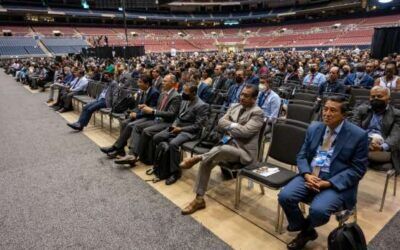In nearly every Seventh-day Adventist Church, the sermon is the focal point of the main service—similar to many Protestant Christian denominations. It is a time of biblical instruction by the pastor, who shares what they’ve been studying in the Bible and preparing over the previous week.
By its engaging stories, illustrations, and explanation of the Bible, the sermon is homily meant to help draw the congregation to a deeper walk with God (Romans 10:17).
Let’s learn more about how sermons work.
We’ll unpack this by addressing some common questions:
- What makes a sermon a sermon?
- What are the different types of sermons?
- What are Adventist sermons about?
- Where can I listen to Adventist sermons?
By the end, you’ll get the feel for how this part of an Adventist worship service fits into the whole experience.
What makes a sermon a sermon?
Photo by Mitchell Leach on Unsplash
A sermon is a religious speech often given during the main service of a church for the entire congregation. The sermons are usually preached by a pastor, though it’s not uncommon for them to be presented by church elders or other leaders. Sometimes members or youth even get a chance to preach for their church family.
This part of the worship service can last anywhere from 20-40 minutes, on average.
Those 40 minutes are meant to speak directly to the heart, giving us some insight that makes the words of the Bible applicable to our daily lives. The focus is not supposed to be on the speaker—but the message from God the speaker is sharing. Then the audience is encouraged to think about God’s will for them, and to study the Scripture for themselves.
How does the speaker accomplish this goal?
Rather than giving lots of information, the speaker focuses on a main point. He or she will draw a practical application from this point and, at the end, call the listeners to take action in their daily lives.
If you want an example of a sermon in the Bible, you can look at what’s called the “Sermon on the Mount,” when Jesus preached to thousands of people about how to apply God’s Word in their lives. It’s covered in Matthew chapters 5-7.
But not all sermons are exactly the same. There are different styles and types.
What are the different types of sermons?
Most sermons can be divided into three main categories: topical, exegetical, and biographical.
Topical sermons
Topical sermons cover a topic from the Bible, bringing Scripture passages from both the Old Testament and New Testament for a comprehensive overview. They can be doctrinal (e.g. the Second Coming, salvation, heaven) or non-doctrinal (e.g. faith, prayer, knowing God’s will). Sometimes, the speaker may focus on the way the Bible uses a particular word or phrase. The possibilities for sermon topics are limitless.
Exegetical sermons
Exegetical sermons look at a specific passage from the Bible. The purpose is to dig into it, explain it, and share contextual details. The speaker may provide the cultural and historical background to the passage or look at the underlying meanings of words. The goal is to bring out the underlying principle the text is conveying.
Exegetical sermons can be narrative or expository.
Narrative sermons focus on a story in the Bible, such as Jesus feeding the 5,000.
Expository sermons hone in on a more theological principle. An example of this would be a passage from Paul’s epistle to the Galatians, where he explains concepts about salvation instead of telling a story.
Biographical sermons
Biographical sermons go through the story of a character in the Bible, pinpointing the lessons we can learn from it. They can be either topical, involving texts from many places in the Bible, or exegetical, focusing on one key passage about that character.
What are Adventist sermons about?
Photo by Martin Schmidli on Unsplash
Like many Christian sermons, Adventist sermons vary in topic but find their foundation in Bible study. The preachers take seriously the counsel in 2 Timothy 4:2 to “preach the Word” (ESV).
Instead of being either fire-and-brimstone messages or fluffy affirmations, Adventist sermons strive to deal with relevant and practical topics from the Bible. They might also contain a prophetic element and a sense of urgency.
These principles come from Jesus Himself.
Jesus spoke the truth to His hearers, showing how it applied in their daily lives. He often used illustrations from familiar objects or occupations to relate to the people (a candle, the lost sheep, the lost coin).
But above all, He quoted Scripture and drove it home to people’s hearts, calling them to make decisions. Prophecy and the importance of readiness underlay His messages.1
Similarly, leaders in the New Testament church preached the Word of God (Acts 4:31; 5:42; 8:4). They referred to the prophecies and stories of the Old Testament to point to Jesus (Acts 13:6–41).
Then, the Holy Spirit used the messages to convict people’s hearts and lead them to God (Acts 2:37).
Adventist sermons follow the model of Jesus and the New Testament church leaders as they empower the audience to seek God.
What makes Adventist sermons different from other sermons?
Like Christian preachers of other denominations, Adventist preachers want to help their listeners learn more about the Bible and grow closer to God. They seek to make Jesus central to their message. But Adventist sermons have some differences too, namely their approach to the Bible and their underlying themes.
Though sermons in other denominations also draw from the Bible’s teachings, Adventist preachers make it a specific goal to make sure the whole Bible shapes their messages. Instead of picking out a single verse and using it to make a point, they look at what the whole Bible says on a topic.
Second, certain themes are common for Adventist sermons that are specifically connected to their beliefs, such as:
- the various aspects of Jesus’ ministry (His life, death, resurrection, and priestly role in the heavenly sanctuary)
- the church’s (body of Christ’s) prophetic mission
- the three angels’ messages of Revelation 14
- The seventh-day Sabbath
- Jesus’ soon coming
(To learn more about these themes, read about the unique mission of the Adventist Church. )
Where can I listen to Adventist sermons?
To hear a sermon in person, visit your local Adventist Church. You can find their service times by checking out their website or Facebook page. If you’re not feeling ready to attend a service, you can catch a live streamed sermon instead.
Online church sermons are also within your reach at some key websites and YouTube accounts. Check these ones out:
Sermons drive us to a deeper relationship with God
We all have the privilege of seeking God for ourselves through prayer and Bible study. But God also uses dedicated people, such as pastors and church leaders, to help us know Him better. Their diligent Bible study and the Holy Spirit’s conviction bring us new insights, hope, and a fresh perspective of the love of God.
The sermon is the part of the church service structure that allows that to take place. Through it, we gain practical wisdom to live out God’s mission for our lives.
Excited to listen to a sermon? Find an Adventist Church near you and stop in one Sabbath. We’d love to have you!
Find a Church
If you’re interested in finding a local Adventist church near you, you can use the Adventist Locator provided by the General Conference of Seventh-day Adventists.
Related Articles
- Find some of Jesus’ sermons in Matthew 5–7, 13, 24, and John 6. [↵]
More Answers
Do Seventh-Day Adventists Have “Rules” For Clothing?
Many religions have guidelines on dress, but what about the Adventist Church? Discover how Adventists choose to dress based on biblical principles.
11 Reasons People Become Seventh-day Adventists
Curious why many people become Adventists? Here are elements of Adventist beliefs, values, and mission often reflected in people’s decisions to join.
What’s the Seventh-day Adventist General Conference Session?
At the General Conference Session, Adventist delegates from around the world gather to assess the state of the organization, pray, and discuss current issues. Here’s how it works.
How Adventists View the End of the World
The end of the world is no fun to think about. But here’s how we can actually find hope and comfort in what’s to come.
What Is an Adventist Medical Missionary?
A medical missionary in the Adventist Church is someone who cares for the medical needs of people as a way of showing the love of Jesus. They may travel to another country, or even just serve in their hometown.
Is the Seventh-day Adventist Church Protestant?
Learn how the beliefs of the Seventh-day Adventist Church align with the “5 solas” of Protestantism.
Are Seventh-day Adventists Evangelicals?
According to its origins and definition, evangelicalism is about following Jesus and the Bible and sharing the Gospel through the way we live our lives. Adventists wholeheartedly harmonize with these principles.
Could Anything Keep Me from Becoming an Adventist?
We are each saved through Christ. But when it comes to church membership, are there certain beliefs or expectations to become an Adventist?
Do Seventh-day Adventists Have “Rules”?
We uphold principles we believe will help us maintain a closer relationship with Jesus and His Word. Learn how these principles guide Adventist lifestyles.
Do Seventh-day Adventists Have “Rules” For Marriage?
Around the world, many cultures and religions have various marriage traditions, expectations, or even rules when it comes to choosing a partner, planning the wedding, extended family logistics, or a number of other things.
Can a Seventh-day Adventist Marry a Non-Adventist?
Yes. Seventh-day Adventists are not under any official rules that dictate who they can or cannot marry. This is a personal, life-altering decision between the couple and God.
What Adventists Believe About Alcohol and Tobacco Use
The Seventh-day Adventist Church has historically discouraged the use of alcohol and tobacco. Even before the church started in 1863, its leaders were realizing the negative effects of these substances.
Jewelry—Why Do Many Seventh-day Adventists Choose Not to Wear It?
If you walk into a Seventh-day Adventist church service, you might notice that many people aren’t wearing earrings, bracelets, necklaces, or sometimes even wedding rings.
International Pathfinder Camporee
Youth aged 10-15 in the Adventist Church’s global Pathfinder program look forward to the International Camporee every 5 years. This event brings together Pathfinders from around the world for exciting activities.
How Adventists interpret Bible prophecy
Bible prophecy conjures up a variety of emotions in people. For some, it feels exciting or mysterious.
Moviegoers’ Guide to The Hopeful: The Facts Behind the Film
Learn where and when you can watch The Hopeful and how to get tickets. Already seen it? We’ll uncover the real story that inspired this film.
How Are Seventh-day Adventists Different from Other Protestants?
As a Protestant Christian denomination, the Seventh-day Adventist Church regards the Bible as the ultimate guide and looks to Jesus Christ as the only way to salvation. We do have some differences of belief or interpretation when it comes to topics like Bible prophecy, end-time events, the Sabbath, and a person’s state after death.
How Adventists Handle Death and Funerals
Most Seventh-day Adventist funeral services are similar to those of other Protestant denominations, such as Methodists, Baptists, or Presbyterians, but you might find a few differences or unique nuances.
Adventist Culture
Many Seventh-day Adventists adhere to specific lifestyle principles that can make them stand out from those in other Christian denominations. Whether it’s going to church services on Saturday or eating the popular Adventist entrée of “haystacks.”
Do Adventists Observe Easter-Related Holidays?
Jesus Christ’s resurrection, celebrated on many Easter-related holidays, is central to the beliefs of the Seventh-day Adventist Church. And that means we seek every opportunity to remember it.
An Overview of Seventh-day Adventist Higher Education
The Seventh-day Adventist Church has about 118 tertiary schools around the world. Though many of them are within North America, you’ll also find Adventist universities in countries across the world—places like Croatia, Austria, Brazil, Madagascar, and the Philippines.
The Ten Commandments from a Seventh-day Adventist Perspective
Ever eaten a salad and gotten a big piece of green stuck in your teeth? And you didn’t realize it was there until you looked in the mirror? (Because no one ever told you!)
The Benefits of A Seventh-day Adventist Academy
Adventist academies are high schools (grades 9-12) that are owned and operated by the Seventh-day Adventist Church.
Are Seventh-day Adventists Christians?
Yes, the Seventh-day Adventist Church is a Protestant Christian denomination formed in 1863. Just like other Christians, we believe that Jesus Christ is our Savior and seek to follow the principles of the Word of God.
Adventist Movies: Where Faith and Film Meet
The Adventist Church uses film to share our faith and uplift positive values. Learn more about specific Adventist-produced films and where to find them.
Do Adventists Celebrate Christmas?
In general, most Seventh-day Adventists do celebrate Christmas.
Since our denomination doesn’t have specific guidelines about holidays, it’s up to each member to decide whether to celebrate it based on their personal convictions and study of the Bible.
What Does the Bible Say About Modesty
Seventh-day Adventists and Christians in general try to ensure their outward presentation and lifestyle glorify God. This often involves daily habits like the ways we hold conversations, the ways we dress and accessorize, and the ways we regard other people when we’re out and about.
How Do Adventists Make Movie and Music Choices?
How do Adventists decide what music to listen to and which movies to watch? Learn how Bible principles can help us make better entertainment choices.
Does the Seventh-day Adventist Church Believe in Paying Tithe?
Seventh-day Adventists believe in paying tithe and offerings based on the biblical command and our commitment to being wise stewards of God’s resources. These donations help fund the mission of the Adventist Church by supporting pastors, missionaries, church expenses, and evangelistic projects, among other things.
Didn’t find your answer? Ask us!
We understand your concern of having questions but not knowing who to ask—we’ve felt it ourselves. When you’re ready to learn more about Adventists, send us a question! We know a thing or two about Adventists.



























